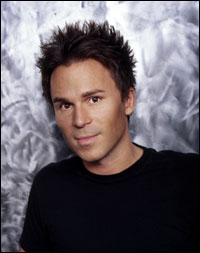BT talks about his passion for audio and video creation
A longtime staple in the dance music scene, BT (born Brian Transeau) is one of the few electronic music artists to successfully make the jump to film scoring. His work on films like Go, The Fast and the Furious, Under Suspicion, Monster, and most recently Stealth proves that not only can he rock the clubs, but can also match beats with the movie industry’s finest.

VEGAS Creative Software: You’re one of the few electronic music producers who has successfully made the transition from recording artist to film composer. That couldn’t have been easy.
BT: It’s a predominately orchestral game, so it’s difficult to get taken seriously. They look at people from the electronic music community as a bunch of meatheads who listen to kick drums all day long. “What do they know about writing a film score?” So it’s breaking through that social stigma.
VCS: Even though you’re a big proponent of ACID and Vegas software, you’re known for composing in very non-traditional ways. An older track of yours, “Fibonacci Sequence,” comes to mind.
ACID is instantaneous gratification in a way that’s not talking down to the user, nor is it making music for you. It’s a phenomenal compositional tool. – BT
BT: The compositional process for me can involve anything from writing with an acoustic piano to building an instrument in code. “Fibonacci Sequence” is based on the Golden Ratio, so all of the relationships in that song, both rhythmically and harmonically, are based on that mathematical ratio. I like setting challenges like that for myself. I find it really rewarding creatively.
VCS: How does Vegas software fit in with your production flow? I know you’ve used it as an editing program for video in your live shows.

BT: The coolest thing about Vegas is the ability to work using bars and beats. Final Cut® doesn’t have it. You can’t do it on Avid®. You can’t do it in anything other than Vegas, and I can’t wrap my head around it. When you’re working with video and sound simultaneously,
and doing it to bars and beats, you can do some of the coolest things I’ve ever seen in my life. It’s created from a very musically informed perspective; it’s a piece of software written for me to use. There’s no other piece of software that’s written for musicians to edit video. It doesn’t exist. The stuff that I’m doing in Vegas I’m very proud of.
VCS: You’ve been using ACID software for quite some time now for audio and video creation, despite being known primarily as a Mac® user. What has kept you loyal to the product for so long?
BT: It’s seamless, it doesn’t crash, and it runs so awesome on my AMD machines. I do two things in ACID. I like using it as a VST host, and I use it as a compositional tool. I’ve got it chock-a-block stocked with my own loops and they’re all keyed. I just grab three bass lines, an ACID line and a bunch of percussion, and it all loads in so fast. Initially, when [Ableton] Live® came out, it was viewed as a really competitive tool with ACID, but they’re totally different. Live is great to perform with, but in the studio, I don’t have the luck with it that I have with ACID. ACID is instantaneous gratification in a way that’s not talking down to the user, nor is it making music for you. It’s a phenomenal compositional tool, and it’s got the same hook as Vegas. How simple of an idea, but how profound of an idea it is to be able to be edit audio and video to a grid?
VCS: What would you say to people who see words like “loops” and “grid” and view ACID as an entry-level product?
BT: I’d say you have the wrong idea about it. I’ve got access to all the tools in the world that I could ever want…tools I’ve been coveting in Keyboard Magazine since I was a kid and then some. Something I hope people know about me is that I talk about the things I use really honestly and with integrity. I’m not going to say I think something is cool because somebody gives me some free stuff. As a working film composer and a recording artist, I use it because it’s easy to use, but it’s really, really powerful.
VCS: How do you use material from our Loops & Samples collection?
BT: They’re ridiculously strong loop libraries. There are other loop libraries you know are going to be hit and miss, and they’re not the kind of thing you can audition. But you know if you buy an ACID library, you know there’s gonna be dope shit on it. It’s guaranteed.
VCS: Any favorites?
BT: Blip is amazing, and the one by David Torn, SPLaTTeRCeLL, is incredible.
VCS: Do you think that using these various sound libraries increases your ability to think outside of the box by mixing instrumentation that you wouldn’t necessarily put together in a studio session?
BT: Absolutely. Anything that pushes music forward is all about happy accidents. Having such a diverse selection of sound sources encourages that immensely.
